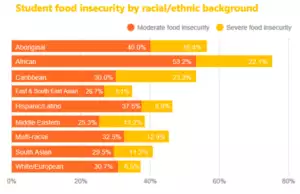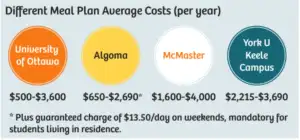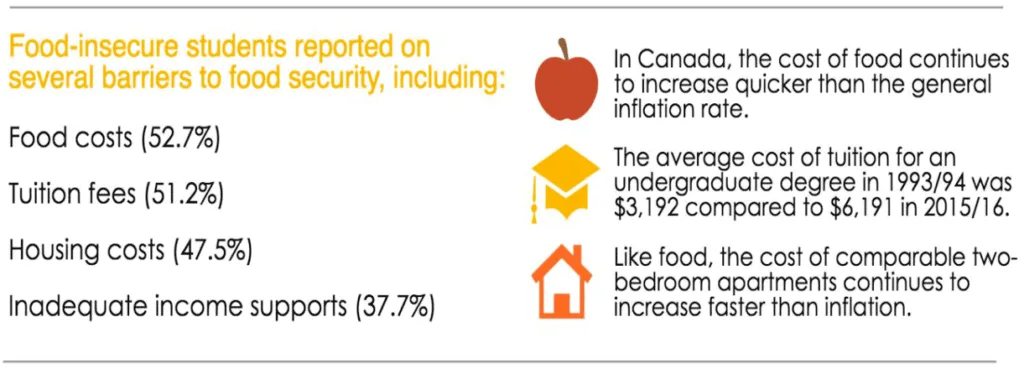Investing in Students: Not Only a Dollars Game
Nearly 40% of students in Canada are food insecure. This can be experienced in many ways, ranging from not having enough money to purchase meals, skipping meals, or not eating nutritious foods.
Food insecurity affects a person’s physical, mental, and emotional well-being. 50% of students that took part in this study faced the alarming decision to eat, pay tuition, pay for textbooks, or pay their rent.

Infographic retrieved from Meal Exchange
Increasingly, post-secondary students are turning to food banks for help. In 2016, 3.1% of food bank users (26,768) across Canada were students. It is estimated that there are many more food insecure students than reported in food bank statistics, as the social stigma of getting help holds students back from using food banks. There are currently 104 campus-based hunger relief programs across Canada; in 2004, there were only 51.
Food insecurity is a serious problem posing numerous health risks for post-secondary students, including low levels of functioning, illness, anxiety, depression, or suicidal thoughts. One in 4 students said food insecurity affected their physical health while 1 in 5 students said food insecurity affected their mental health.
Last year, the Canadian Federation of Students voiced concerns over the quality of campus food across Canada, stating a need for healthier options with less processed foods that meet dietary needs, the use of local ingredients, and multicultural options. The already limited options students have on campus are accompanied by premium prices. Below is an example of prices paid by students in Ontario:

Infographic retrieved from Canadian Federation of Students Ontario
Food insecurity is a systemic issue, currently accompanied by other financial burdens and problems experienced by post-secondary students:
- The average cost of tuition for an undergraduate degree in 1993/94 was $3,192 compared to $6,191 in 2015/16
- Per Statistics Canada the average undergraduate student debt was $20,500 in 2000, while undergraduate students graduated with an average debt of $26,500 in 2014
- Government funding and support for post-secondary students is decreasing
- 2% of the students surveyed were employed during the school year, almost all (96%) were working low-skill, low-income service sector jobs.
Because of the demand for post-secondary certification, student debt is a contemporary and growing issue. It is predicted that by 2031, 80% of new jobs in Canada are expected to require some form of post-secondary education.

Infographics retrieved from Meal Exchange
The current system is failing future generations. Short-term solutions like food banks do not address the underlying barriers experienced by students, nor are there enough resources to help all students succeed. Everyone has the right to obtain an education and create an adequate standard of living for themselves.
Instead of spending money on doubling the number of food banks on campuses, governments should invest in their students. They can reduce tuition fees, expand scholarships and bursaries and continue to reduce the amount of debt after graduation.
Post-secondary campuses also need to do their part by recognizing the needs of their current student population. Schools need to implement healthier and more affordable meal plans that complement dietary needs and can also utilize other sources of financial relief for students, such as implementing used bookstores or purchasing books back from students at a reasonable cost.
The overwhelming financial burdens and resulting food insecurity facing students in Canada are unacceptable, particularly given how our society views education as an investment that is fundamentally necessary for the growth and development of the country. With the current system being unsustainable, we all need to do our part and help students continue to access and succeed in school without facing the choice to pay for tuition or food.
Claudia Langevin is a Placement Student at CWP in the Carleton Bachelor of Social Work program.
